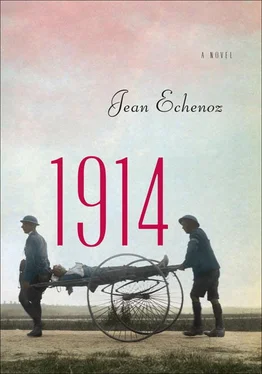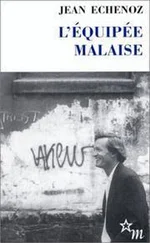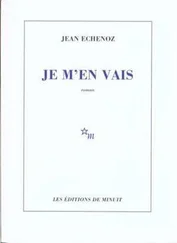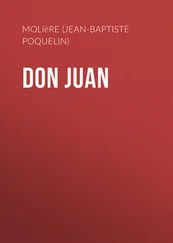Just a walk, for a moment, taking advantage of some anti-typhoid procedures. Reporting for a vaccination booster shot, Arcenel was one of the very first to receive his, thanks to his prime place in the alphabetical list, so since everyone was all lined up, discreetly baring their bums to the needle with a frisson of fear, Arcenel just as discreetly walked off on the spur of the moment, without any particular plan. He left the camp with an evasive wave to the sentinel as if he were just going to go pee against a tree trunk, which in fact he did, while he was at it, but then he went on. When a path appeared, he took it simply to see, before turning off onto another and another without any precise intention, advancing automatically into the countryside without really meaning to wander off.
Relaxing instead into his appreciation of the burgeoning spring—it’s always moving to admire the spring, even when one has begun to recognize the pattern, it’s a good way to brighten a dark mood—Arcenel paid just as much attention to the silence, a silence almost untainted by the rumblings at the front, never very far away, rumblings that this morning even seemed a trifle fainter. An incomplete silence, naturally, not entirely restored but almost, and almost better than if it were perfect because it’s clawed by the cries of birds, cries that somehow amplify it and, giving depth to a background, exalt it, in the way a minor amendment gives strength to a law, a dot of contrasting color intensifies a monochrome, the tiniest splinter confirms the smoothest polish, a furtive dissonance consecrates a perfect major chord—but let’s not get carried away: let’s get back to business.
Some animals appeared, still there, seemingly bent on showing the flag: a raptor way up in the sky, a June bug sitting on a stump, a furtive rabbit, which hopped out of a bush to stare at Arcenel for a second before promptly dashing off, spring powered, without the man instinctively grabbing for the rifle he hadn’t actually brought with him, not having brought along even his canteen: proof that he’d never planned beforehand to leave the military zone, being moved solely by the idea of ambling around a little while, abstracting himself for a moment from the horrific shit hole, not even hoping— because not even thinking of it—that this stroll would pass unnoticed, forgetting that the men were recounted all the time, and the roll call endlessly repeated.
Beyond a bend, the fourth path broadened into a grassy clearing carpeted with cool light filtered by the freshly unfurling leaves, a delicate tableau. But on a corner of this carpet were three men on horseback, in tight uniforms of horizon blue, backs straight, mustaches brushed, expressions severe, aiming at Arcenel three examples of the 1892 8-millimeter French service revolver while ordering him to present his service record booklet, but he hadn’t brought that along with him either. They asked him for his serial number and enlisted assignments, which he recited by heart—section, company, battalion, regiment, brigade—while opting to meet the gentle, attentive, and deep gaze of the horses rather than the eyes of the gendarmes. Who did not bother asking him what he was doing there: they tied his hands behind his back and ordered him to follow, on foot, the equestrian detachment.
Arcenel should have remembered about them, the gendarmes, so hated were they in all the camps, almost as much if not more than the fellows across the way. Their task had at first been simple: to keep the soldiers from slipping away, to make sure they would go get themselves killed properly. Positioned in lines behind the troops during combat, they’d formed a barrier to break up waves of panic and check spontaneous retreats. Soon they’d taken control of everything, intervening wherever they pleased, maintaining order along all thoroughfares in the confusion attendant on the fluctuating movements of troops, policing the military zones in their entirety, at both the front and the staging area behind the lines.
Responsible for checking the passes of soldiers on leave and overseeing all who tried to cross the official perimeters surrounding military units—mainly the wives and whores attempting for various reasons to rejoin the men, but also (and these met with more indulgence) the tradesmen of all kinds, who, selling everything at sky-high prices, proliferated as eagerly as the other parasites on the infantry’s back—the gendarmes also tracked down soldiers overstaying their leave, drunks and troublemakers, spies, and deserters, into which last category Arcenel had just unknowingly and unwillingly placed himself. That’s how come, back in camp, Arcenel spent the rest of the day and then the night in the locked pump house for the village of Somme-Suippe, without either bread or water, and appeared the next morning before a court-martial.
Arcenel was pushed more than led into the village schoolhouse, where this improvised tribunal sat in the largest classroom: a table and three chairs, facing a stool for the accused. A creased national flag behind the chairs, a Code of Military Justice on the table next to some empty forms. These chairs were occupied by a three-man court: the regimental commander flanked by a sublieutenant and a senior warrant officer, and they watched Arcenel enter in silence. Mustache, erect posture, and cold eyes: to Arcenel these men looked just like the ones from the day before, mounted on their horses in the clearing. Since the hour was grave and the shortage of manpower serious indeed, perhaps it had proved necessary to recruit the same actors for this scene, giving them just enough time to change uniforms.
In any event, it all went very quickly. After a brief summary of the facts, a glance for form’s sake at the code, an exchange of looks among the officers, the court voted with a show of hands to condemn Arcenel to death for desertion. Sentence to be carried out within twenty-four hours, the court reserving the right to refuse any appeal for clemency, the idea of which had never even crossed Arcenel’s mind. He was returned to the pump house.
The execution took place the next day near a large farm at Suippe, [12] Suippe: Le Cimetière militaire français de La Ferme de Suippe, a French National Necropolis, contains the remains of more than nine thousand combatants killed during both world wars. At five a.m. on March 10, 1915, the French soldiers of the 21st Company of the 336th Infantry Regiment, exhausted by fighting and losses sustained during two months of fruitless combat in their sector, were ordered to launch a fresh attack on the enemy’s position north of the village of Souain. The terrain in front of them was strewn with the corpses of their comrades, cut down by withering German machine-gun fire in several recent abortive attacks or fatally enmeshed in the barbed wire both sides deployed to protect their positions. French artillery fire, intended to soften up the enemy, was instead pounding no-man’s-land and its own trenches. A witness would later claim that General Réveillac, who ordered the attack, was trying to drive his men out into the open. The French soldiers refused to budge. (During the ensuing court-martial, one of the defendants insisted that “whoever went over the top would have been literally mowed down by either our fire or the German machine-gunners.”) Incensed, General Réveillac ordered the company commander to submit the names of eighteen soldiers and his six youngest corporals, who were brought before a court-martial. Meeting on March 16 in a room of the city hall in Suippe, the court-martial acquitted the soldiers and two corporals and condemned to death corporals Louis Girard, a watchmaker; Lucien Lechat, a café waiter; Louis Lefoulon, a railroad worker; and Théophile Maupas, a teacher. On the following day, March 17, two hours before the camp was informed that their sentences had been commuted to hard labor, the condemned were shot at the Suippe Farm. Upon receiving the news of her husband’s execution, Blanche Maupas began her long battle seeking justice for the corporals of Souain with great courage and perseverance. In 1934, the four men were at last rehabilitated by the Special Military Tribunal for the Review of Court-Martial Convictions, and their names were cleared. In 1957 Stanley Kubrick made Paths of Glory , based on the novel of the same name by Humphrey Cobb, which told the story of the corporals of Souain. Starring Kirk Douglas, the film was released to critical acclaim but was not shown in France until 1975.
at the firing range, with the entire regiment present. Arcenel was made to kneel in front of six men lined up at attention, arms at the order. Among them, from four or five yards away, Arcenel recognized two men he knew, doing their best to look elsewhere, while a divisional chaplain stood in the background. Between them and himself, in profile, an adjutant in charge of the firing squad was waving his saber. The chaplain did his little job and after Arcenel had been blindfolded, he did not see the men he knew raise their rifles as they stepped forward with the left foot, did not see the adjutant raise his saber, he just heard four brief orders shouted, the fourth being Fire. After the coup de grâce, at the end of the ceremony, the men were ordered to march past his body so they would reflect upon his fate.
Читать дальше









